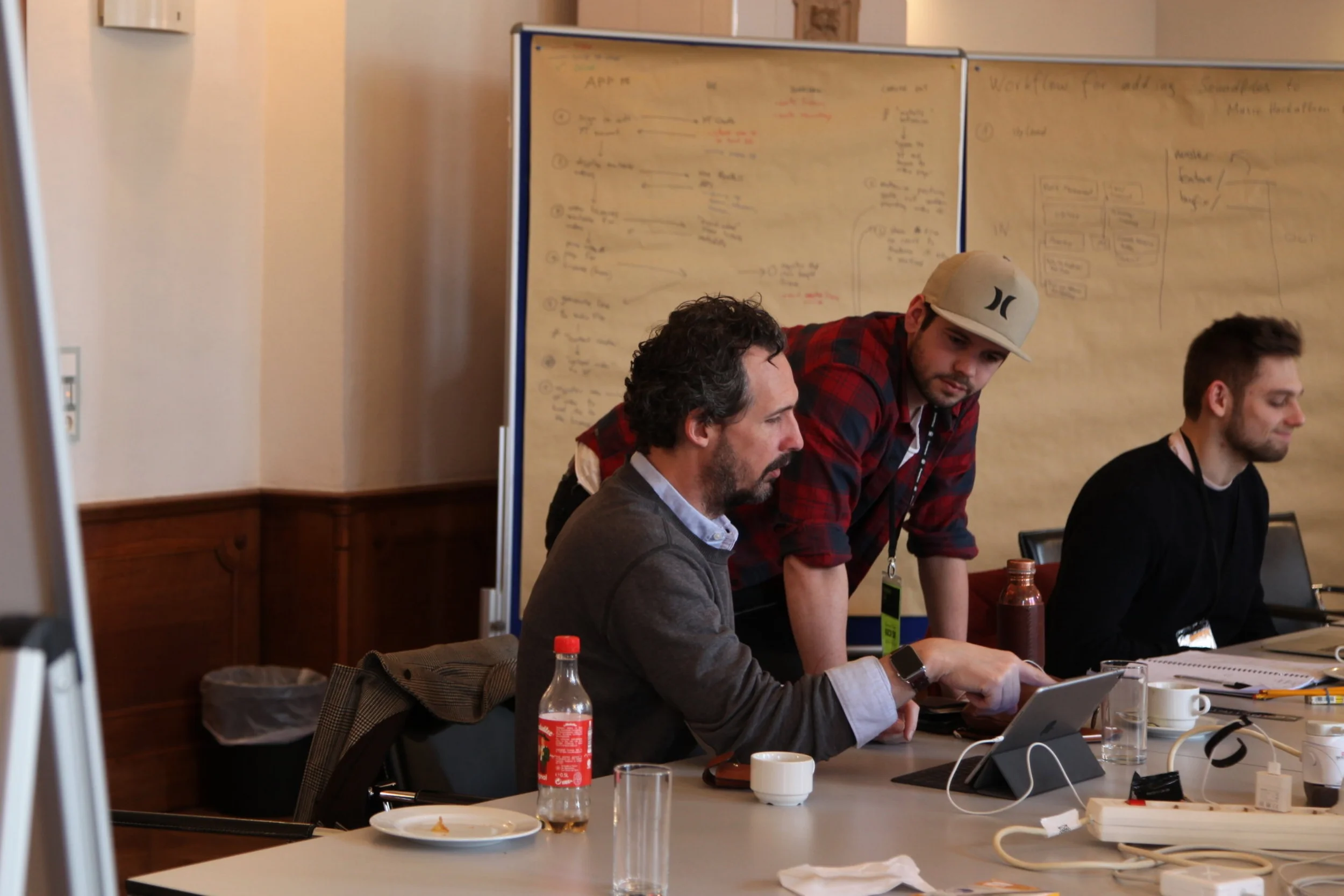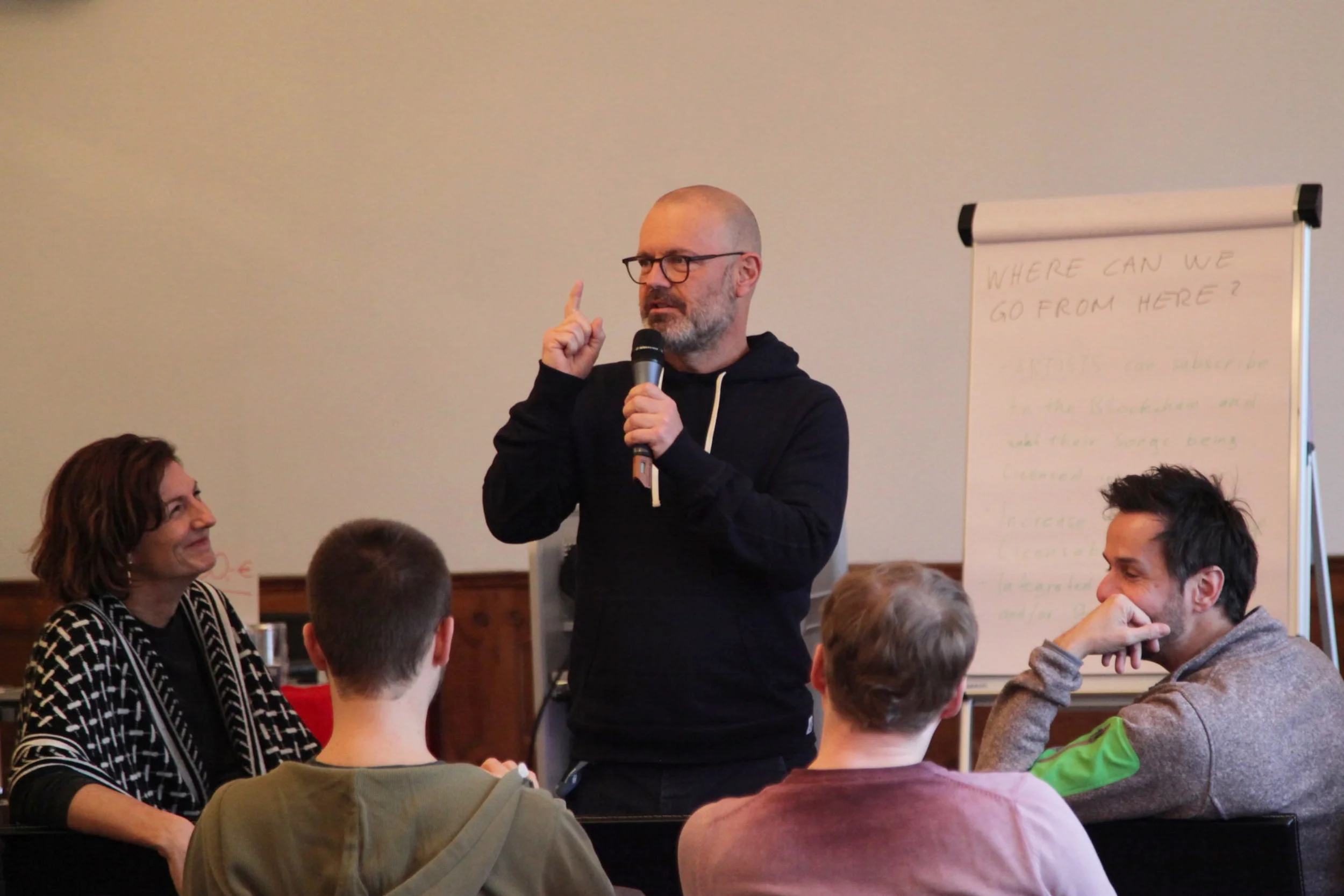Salzburg Hack: A 12 Hour Sprint to Build A Blockchain Music Product
The first question I was asked on the excellent panel discussion that was held in a building called - I kid you not - The Mozarteum in Salzburg was, “George, why are you here?” That’s a pretty fair question to ask of me in almost any situation, but particularly apt given the fact that it was a Wednesday in Salzburg Austria...and I live and work in Boston. My answer to this question, however, summed up an awful lot about what made the most recent Open Music Initiative project at the Karajan Music Tech Conference so unique. I answered, “I go where the energy goes, and for the past several days, the energy has been in Salzburg.”
Let me unpack that a bit. The state of music-centric Blockchain projects is, in my opinion, at a very critical juncture. It’s sort of make or break time. The initial surge of enthusiasm is being tested by a combination of typical “trough of despair” trajectories and any number of promises without results. Quite frankly, as was frustratingly evident at this year’s SXSW, there’s simply too much talk and too little action. It’s now time that the music ecosystem must expand to include a tremendous number of more adjacent and orthogonal players. Unless and until we begin building and shipping product, the chances of artists making sustainable livings on their own terms is pretty much zilch.
So...off to Salzburg I went. In addition to being the home of Mozart, Salzburg is also the home of The Eliette and Herbert von Karajan Institute and Red Bull Media House. Whatever you may think of Red Bull’s product, their commitment to music is unassailable; it appears to be in their DNA --something that makes much more sense to me now, having been to Salzburg.
The other thing that Red Bull has that is so relevant to a Blockchain-based music project is a collection of music that they completely control and can license. The importance of this detail can not be understated. One of the key stumbling blocks for many Blockchain-based music projects is that most musical works - at inception - have at least two copyrights. One copyright for the composition that is owned/controlled by the writer/publisher and one for the sound recording that is owned/controlled by the label. Often, each of those copyrights are controlled by multiple parties.
This distinction in control and ownership is the exact reason why attempting to utilize Blockchain tech at its current highest and best form, meaning the use of smart contracts to create efficiencies around licensing, is simply not practical at the current time.Too many entrepreneurs in the space vastly overestimate the current state of smart contract technology, and by asking too much of them, failure is almost guaranteed. These failures send signals to the broader market that Blockchain is not a viable solution for music. Of course, this isn’t true, but, as with any nascent technology, the key is matching tech development with customer expectation/demand.
Thus, it’s crucial to choose projects that, while pushing the edges of tech capacity, are in fact able to be executed.
With this as our mandate, we set out to utilize this technology to address a real issue for both Red Bull and artists. We settled on utilizing Blockchain to improve on an existing product that Red Bull already offers in order to not only create efficiencies for Red Bull, but also to open the door more widely for more participants. Most importantly, we began the process of creating more opportunities and streams of revenue for more artists.
Significantly, we were guided by the Open Music requirement documents - a set of best practices generated by the Open Music members that outline our core values - and designed our project in accordance with the Open Music API spec. In so doing, we ensure interoperability amongst various stakeholders' data sets. A special shout is warranted to Context Labs, and, in particular, Dan Harple, Gavin Nicol, and Daan Archer for their work on both the requirement docs and API.
George Howard at work with the hackers
In short, Red Bull currently allows those who wish to utilize music in the videos that they make to license music directly from Red Bull. The process is fairly straightforward, and the costs to the person wanting to create the video and utilize Red Bull’s music is next to nothing (erm...1.99 for the UGC license, 29.99 for a semi-professional license which allows you to monetize yourself against your video). Due to systemic challenges, once this music has been licensed and then embedded into a new video, pretty much everyone loses track of the work...until it’s found by YouTube.
So...we set out to utilize Blockchain Tech in order to both create efficiencies and transparency around this process, and —more importantly— create a disintermediated system for more efficient/direct payments that will expand the overall music ecosystem.
To this end, we set out to improve the existent current flow, which is as follows: I desire to put some music into a video of me doing some kind of extreme sport (let’s refer to me as “BMX George”). So I go to Red Bull’s page on their site, look at some of their current videos featuring music, pick the music I like, fill out a few forms, pay 1,99, download the song, combine it with my video, and then upload it to YouTube.
Now, imagine that BMX George is pretty badass, and my video starts getting a ton of views. At this point, YouTube’s content ID will pick up the track and contact Red Bull in order to put an advertisement on the video that I, BMX George, made.
Red Bull would very much like both BMX George and the person who wrote the song to get a percentage of the money from the ad that Google/YouTube slaps on the video.
The issue is that the current system requires any number of lawyers and intermediaries.
We set out to improve this system —using Blockchain/Smart Contracts— to achieve direct and real time royalty accounting at source and a bypass of RadKey. We (and that’s overly generous to me: the real coders/heroes were Luca Zambarda and Mike Christensen from Blokur and Lukas Oberbichler from Tribe...by the end of the hack, it was just these three true believers and me, alone in an empty college at one in the morning; heroes) created a system where, when the song is downloaded, a record is created on the Blockchain, and when that song is then embedded into a video and then posted to YouTube, a similar record is created. From there, a smart contract model was created that has the following the functionality:
Registering that a particular Youtube account owner has purchased a license for a recording.
Registration of the use of that recording in a given YouTube video.
Defining how the money is divided once the payment is received from YouTube.
In this manner, the various stakeholders —from Red Bull to BMX George to the original composer of the song— all could not only have line of sight with respect to usage and payment, but also receive money...with no intermediaries.
It’s not perfect. There are lots of things that need to be improved. There are potential issues around scalability/speed/etc. But it does work. It does show how Blockchain tech can provide a real solution...if you start with the correct problem set/data set, and don’t ask too much of the current technology.
You can also imagine how something like this could grow. I can promise you that once BMX George gets some money for this, he will make more videos. And, wouldn’t you know…BMX George is also “Guitar Player George,” and he might decide to start posting songs for others to use. And, of course, the writer of the original song, who certainly didn’t expect to see another dime beyond what Red Bull paid for the track, will be so delighted by this “found” money, that she will not only make more music, but will tell all her friends.
Perhaps other entities who work with artists might encourage them to put their music into the pool for consideration, and additional rules for the smart contract could be created to apportion the money amongst the rights holders. Then, and this is where it gets most interesting to me, other music adjacents, a la Red Bull, could begin utilizing music in their campaigns -- or any way they desire-- and make deals with songwriters that are participatory --rather than governmentally-- set, transparent, and paid absent intermediaries. In this way, the entire ecosystem grows, and acts as a counterbalance to the inexorable downward spiral of music pricing due to the overwhelming commoditization that is occurring.
Martin Brem, Head of Music Portfolio / Red Bull Media House
So...yeah, I go where the energy is. And in the waning weeks of March in Salzburg, that’s where it was. I’ll leave you with my favorite moment of the event. When Martin Brem, Head of Music Portfolio / Red Bull Media House, was asked why they were involved in Open Music and why they were committed to this project, he simply said, “Because it’s the right thing to do.”
—
The Hackathon would not have been as meaningful without participation from real industry players, with real industry experience. Here are some thoughts from various partners who participated in the event:
Red Bull Media House
“These are exciting times for music. Technology has paved the way for the broadest access and heaviest consumption of music ever, which also comes with the technical ability to track and trace and account in a much more accurate way than ever before. We just have to overcome the legacy methods and legacy attitude of a music industry that traditionally wasn’t always so keen on transparency. This won’t be achieved overnight, but it will happen eventually. Small steps like seamless micro-licensing solutions with direct transactions between rights-holders and clients should help open some new doors.” - Martin Brem (Head of Music Portfolio / Red Bull Media House)
SoundCloud
"As the world's largest open audio platform, SoundCloud has some of the most interesting licensing challenges in music today. We are always exploring new, innovative ways to improve processes, and manage rights and data for rights holders and artists — both emerging and established. Our team is watching this space closely." - Joe Kearney (Tech Lead, Data Platform / SoundCloud)
von Karajan Institut
"We are at the verge of a tectonic shift in the music industry. For the first time we have the technological means to build a music industry that is fair to artists and creators. I am super excited that those who dream of a new future for music have come together in Salzburg to build an open source software tool that one day the whole industry will use. Never underestimate the power of a simple idea and the determination of a small group of individuals to make it happen." - Matthias Röder (CEO Eliette and Herbert von Karajan Institute & Board Member of Karajan Foundation)
Salzburg University of Applied Sciences
"It was pretty mind-blowing to see an interdisciplinary team of artists, coders, lawyers, business executives and organizers collaborate, think and work on a solution of global scale (and matter)." - Marius Schebella (Salzburg University of Applied Sciences)
Blokur
"The success of the [Red Bull] hack goes to show just what can be achieved if we bring the right group of people together with a mind-set that is open to collaboration and innovation. Tackling the challenges of tomorrow’s music industry is a task that will require participation right across the ecosystem, combining ideas and expertise to maximise value. Blokur is excited to be part of that process, working together with partners across the music industry to identify and solve problems for mutual gain." - Phil Barry (Founder / Blokur)
Repertoire
"For the long term viability of the music industry, in the end to survive in its current form, it is imperative that the industry manages to align on a global, neutral repository containing a base set of information, which will be used for worldwide integration and reconciliation." - Erik Beijnoff (Founder / Repertoire)


